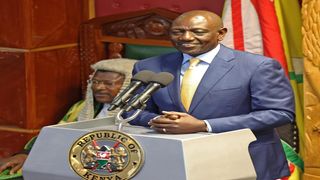
President William Ruto speaking at Parliament on November 9, 2023, during the State of the Nation address.
| PCSPolitics
Premium
Verdict: President Ruto’s speech heavy on context but light on emotion, call to action
What you need to know:
- The President appeared and sounded exhausted.
- There was no punch in his delivery.
Was it the speech, its delivery, or the rather diffident mood in the National Assembly that made President William Ruto’s State of the Nation address somewhat underwhelming? Watching the proceedings on TV, one got the sense that Ruto was not in his element.
There is a characteristic way in which he delivers his speeches, with swagger and a bit of extravagance in his poise, but all that was missing. Instead, the President appeared and sounded exhausted. There was no punch in his delivery. No charm. And the trademark magneticism with which he is known to deliver his speeches was lacking from start to finish.
This graphic shows how Smartocto’s user needs engine rated President William Ruto’s speech on the four parameters of action, fact, context and emotion.
Of course I could be mistaken. And I know very well that I might be accused of being harsh on the President. These are the musings of a reporter who has pored over hundreds, perhaps thousands, of minutes of the President’s speeches, and who has attended one or two of his rallies.
Hands down, His Excellency President William Samoei arap Ruto is one of the best orators of the current crop of African Presidents, high up there in the league of Lazarus Chakwera, President of Malawi. He doesn’t struggle to deliver his speeches, which are often punctuated with splashes of similes, African proverbs, and quotes from some of the best minds in history.
But on Thursday, he didn’t appear to have much of that. He read his speech from a teleprompter placed a few metres away from the lectern and deftly edited from view by the Parliamentary Broadcasting Unit’s cameras.
As he extolled the nation to tighten its collective belt in the face of current economic crises, and even as he outlined the successes of his regime, one sensed a rather uncharacteristic vocal drone, as if the President wasn’t talking from the depths of his heart – where convictions lie -- but only verbalising the scrolls on the teleprompter.
Yet, when he stepped out into the gardens of Parliament Buildings, his charm came back. Suddenly, there was a spring in his steps, a slight bounce in his walk, and a smile that radiated self-assurance and a sense of accomplishment. This was Ruto in his element: stout, jovial and sharp on the wit.
In analysing the President’s speech, it would be remiss of one not to look into the contents of the speech itself. Great speeches grab you by the collars of your shirt and force you to sit down and listen to them. They are audience-oriented and play on the desires and expectations of people. They are heavy on clarity – purpose and intent – and do not seek to bamboozle or bewilder. President Ruto’s speech was written, not for the nation, but for the members of the National Assembly and the Senate, and the economic technocrats who gathered at Parliament Buildings to listen to him.
It was heavy on data and light on sentiment. It failed to grasp the mood of the nation and calm nerves, and so it ended up being a fantastic self-analysis of performance rather than a call to national duty and devotion to our brand of nationalism.
To examine how the President’s speech scored on the user needs fronts, which are categorized in the four broad areas of fact-driven knowledge provision, context-driven understanding, emotion-driven feelings, and action-driven call to duty, I ran his 24-page speech in batches through the Smartocto content analysis engine.
The results were interesting, as for most of the batches, the engine rated President Ruto’s speech as being heavy on context, at 60 per cent, and quite low on emotion and action, at 10 per cent each. Even though it was heavy on data, the engine gave the speech a score of 20 per cent on the fact-driven realm.
The engine explained the score thus: “The article primarily satisfies the contextual user need as it provides context and perspective on the state of the nation. It also partially satisfies the functional user need by stating facts about the government's efforts. However, it lacks emotional and actionable elements.”
Is this what the President wanted to achieve? Is it possible he only wanted to contextualise stuff and let Kenyans judge his regime, not on emotion, but with the benefit of background-setting perspectives? If so, he scored brilliantly.
Perhaps President Ruto did not want emotion, and perhaps he did not want to hearken the nation to a call to action. Perhaps he just wanted to look back, paint a picture, and walk out. What he did not mince his words about, however, is that the era of false comforts and number massaging was over, and I think it is befitting to end this analysis with his words in paragraph 30 of his speech:
“The time has come, therefore, to retire the false comforts and illusory benefits of wasteful expenditure, and counterproductive subsidies on consumption by which we dug ourselves deeper into the hole of avoidable debt. The new direction may not be easy, but it is ethical, responsible, prudent and, most importantly, necessary. We have had to take hard decisions and make painful choices because we owe it to Kenyans to do the right thing and confront facts as they are without flinching or equivocating.”




